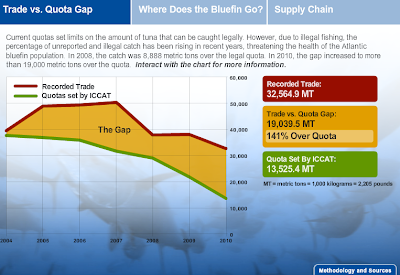Source for this article click this link:
We work globally to establish pragmatic, science-based policies that protect our oceans, preserve our wildlands and promote the clean energy economy.
The Atlantic bluefin tuna is one of the world’s most valuable fish. Spurred by the increasing global appetite for sushi, a multibillion-dollar bluefin tuna fishing industry has developed in the Mediterranean Sea. Because of the supply chain is complex and because catch limits are not enforced effectively, fraud and illegal, unreported and unregulated (IUU) fishing plague the industry.
The International Commission for the Conservation of Atlantic Tunas (ICCAT) sets yearly catch limits for the fishery, but these quotas are regularly exceeded. This creates a significant gap between what should be caught, based on scientists’ recommendations, and the amount actually caught and traded on the international market. In 2008, ICCAT reduced catch limits and improved compliance measures to address IUU fishing.
Mind the Gap, a new report commissioned by the Pew Environment Group, looks closely at 2009 and 2010, the two years after the measures were adopted. Did those measures close the gap and improve compliance with the quotas set by ICCAT? Has the situation improved?
Click on pic for a large view
Main Findings
Despite recent progress by ICCAT member countries in addressing IUU fishing, more needs to be done to close the gap. In fact, the discrepancy between what is allowed to be traded, based on the quota, and actual trade estimates, continues to widen:
- In 2008, the amount of eastern Atlantic bluefin tuna traded on the global market was 31 percent larger than ICCAT's quota.
- In 2010, the amount traded on the global market was 141 percent above the quota.
- In 2009 and 2010, total trade for both years was 70,646 metric tons (mt), double the legal quota of 35,306 mt for the two years combined.
- From 1998 to 2010, more than 490,000 mt of eastern Atlantic and Mediterranean bluefin tuna, worth an estimated €10 billion (US$13.5 billion) was traded on the global market.
- This is more than 98,000 mt above the ICCAT quotas set for that period.
If these elevated catch levels continue, Mediterranean bluefin tuna have a less than 24 percent chance of rebuilding by 2022, based on a 2010 stock assessment by ICCAT scientists.
What Is Causing the Gap?
- The continued and persistent underreporting and non-reporting of bluefin tuna caught and transferred into ranches across the Mediterranean Sea by industrial purse seine fishing vessels.
- The continued use of prohibited fishing gear, such as driftnets, by Italy and other Mediterranean coastal countries.
- Trade of illegal bluefin tuna by EU Mediterranean coastal member countries through the falsification of bluefin catch documents necessary for sale.
Action Needed
ICCAT member countries will hold their annual meeting in Istanbul from Nov. 11 to 19. These countries must take the following actions to help ensure that the IUU fishing in the Mediterranean is addressed:
- ICCAT countries must fulfill their commitment to develop an electronic catch documentation system to more quickly and accurately identify IUU fishing and ranching operations. ICCAT implemented paper-based catch documentation in 2008 to better track Mediterranean bluefin tuna traded on the world market, but the system is rife with fraud, misinformation, and delays in validation.
- The EU and ICCAT must finally take meaningful enforcement action to address Italy's use of illegal driftnets to catch bluefin tuna. ICCAT member countries must place on their illegal-vessel lists all Italian operators that have been identified as using driftnets in violation of the commission's regulations.











No comments:
Post a Comment